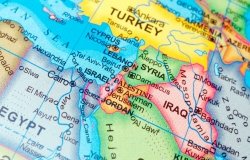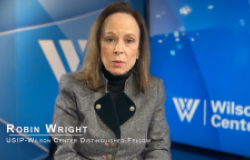Pew: Egyptians Frustrated and Divided
Some 72 percent of Egyptians are dissatisfied with their country’s direction, according to a new Pew Research poll. Nearly a year after President Mohamed Morsi’s ouster, about 54 percent of Egyptians prefer a stable government while 44 percent prefer a democratic one.
Some 72 percent of Egyptians are dissatisfied with their country’s direction, according to a new Pew Research poll. Nearly a year after President Mohamed Morsi’s ouster, about 54 percent of Egyptians prefer a stable government while 44 percent prefer a democratic one. They are also split on the July 2013 military coup: 54 percent favor it and 43 percent oppose it. But favorable views of the Muslim Brotherhood, the military and court system have all dropped since last year. About 38 percent of Egyptians, however, still hold a favorable view of the Muslim Brotherhood. The following are excerpts from the report.
Last July’s military takeover wins support from a slender majority: 54% favor it; 43% oppose. And while the next president is almost certain to be Abdel Fattah El-Sisi, the former general who has been the most powerful figure in the country since last year’s overthrow of the government, the new poll finds that his popularity is limited. Sisi receives a favorable rating from 54% of Egyptians, while 45% view him unfavorably, a more mixed review than many media reports from Egypt over the last year might suggest.
Meanwhile, ratings have declined for former President Mohamed Morsi, the man Sisi removed from power. Currently, 42% express a favorable opinion of Morsi, down from 53% in last year’s survey, which was conducted just weeks before his ouster. However, the fact that roughly four-in-ten Egyptians still hold a positive opinion of the jailed former president may be a surprise to many, given the government’s crackdown on Morsi’s organization, the Muslim Brotherhood.
Ratings for the Brotherhood have also dropped, although again about four-in-ten Egyptians continue to have a positive view of the nearly 90-year-old group, which has been banned by the current regime and seen most of its leaders arrested.
Attitudes toward other major institutions in the country have also turned more negative over the last year. Most notably, support for the military is down. Fifty-six percent say the military is having a good impact on the country and 45% say it is having a negative influence. A year ago, 73% described the military influence as positive and 24% as negative. In a 2011 poll, conducted weeks after the overthrow of Hosni Mubarak, 88% gave the military a good rating, while only 11% assigned it a negative one.
The image of the courts, which have issued numerous controversial verdicts in the past year, has also suffered. Now, just 41% believe the court system is having a positive impact on the country; 58% say the impact is negative. Last year, opinions were the exact opposite: 58% saw the courts positively, 41% negatively.
A Dismal Public Mood
By a 3-to-1 margin, Egyptians are more dissatisfied (72%) than satisfied (24%) with their country’s direction. Dissatisfaction is up significantly from last year’s already high 62%, and in fact, is roughly the same today as it was before the revolution that removed Mubarak from office.
Most Still Want Democracy, but Enthusiasm Is Waning
As they have in the past, most Egyptians continue to embrace the concept of democracy. Roughly six-in-ten (59%) say it is the best form of government, although this is down from 66% last year and 71% in 2011. And most still say it’s important to live in a country with basic democratic rights and institutions, but within the past year support has declined for some key pillars of democracy, such as free speech, freedom of the press, and honest, competitive elections.
Click here for the complete report.
Related Program

The Islamists
Learn more about Hamas and how it relates to similarly aligned organizations throughout the region. Read more










